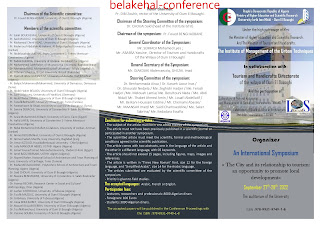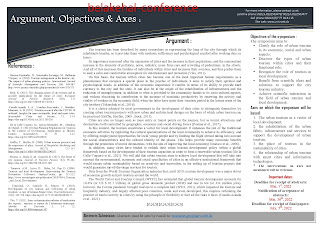An international symposium at the University of Oum El Bouaghi on: The city and its relationship to tourism: an opportunity to promote local development
Argument
The tourism has been
described by many researchers as representing the lung of the city through
which its inhabitants breathe, as it provides them with
aesthetic sufficiency and psychological comfort after working days or
hours.
Its importance
increased after the expansion of cities and the increase in their populations,
and the concomitant increase in
the intensity of pollution, noise, industry, noise from cars and crowding of
pedestrians. in the streets.
And all of this
increases the burdens of individuals within cities and increases their
aversion, and thus pushes them to seek a
calm and comfortable atmosphere for entertainment and recreation (Vles, 2011).
On this basis, the
tourism within cities has become one of the most important human requirements
as a phenomenon that occupies a special place in the
psychic of individuals, it aims to satisfy their spiritual and
psychological
needs, in addition of the economic importance it confers in terms of its
ability to provide hard currency to
the city and the state. It can also be at the origin of the rehabilitation of
infrastructures and the reduction of
unemployment, in addition to what is provided to the community thanks to its
socio-cultural aspects, and without
obscuring its contribution to the increase of economic productivity by renewing
the activity and vitality of
workers in the economic field, when the latter have spent their vacation period
in the leisure areas of the city
territory (Tokarchuk et al., 2016).
It is a choice adopted
by most governments in the development of their cities to distinguish
themselves by creating
urban tourism projects with new urban and architectural designs on the basis of
which urban tourism can be practiced
(Griffin, Hayllar, 2009 , Bock, 2015).
Cities are also no
longer seen as mere entry or transit points on the joumey, but as tourist
attractions and destinations
both controlled by geographic, economic and social driving forces (Postma et
al., 2017).
In this context, the
tourism constitutes a vector for local development. It enhances the rest of the
traditional economic
activities by exploiting the cultural specializations of the local community to
achieve its efficiency, and by offering
employment opportunities for local young people and by limiting the flight
abroad taking into account the social
characteristics and the cultural identity of the places. This helps provide
many economic benefits through the
promotion of tourist destinations, with the aim of improving the local economy
(Tomescu et al., 2006).
In addition, many
cities have tended to rethink their urban tourism development policy within a
global framework based on the development of their
tourism capacities in order to form a renewable urban tourism (De la
Calle-Vaquero
et al., 2021). We will add that urban tourism aims to achieve local development
that will take into account the
environmental, economic and social specificities of cities in an effective
institutional framework that would ensure
urban sustainability based on creativity and innovation, in the setting up of
tourism projects that would
guarantee top-of-the-range services for tourists.
Data
from the World Tourism Organization indicates that, until 2019, tourism
development was a major driver of economic
growth and job creation around the world.
The World Travel and
Tourism Council (WTTC) has estimated that global tourism development accounts
for 10.4%
(or US $ 91.7 trillion) of global gross domestic product (GDP) and one in ten
(or 334 million jobs), however, the
Corona pandemic brought tourism to a complete halt (WTO, 2021), which impacted
the tourism and hospitality
industry, and largely affected poor countries, weak and even developed, this
requires rethinking the practice of
tourist activity in cities by using the principle of flexibility to face all
the risks it faces (Casado-Aranda et al.,
2021).
Objectives of the symposium
The symposium aims to:
- Clarify the role of urban tourism
in
its economic, social and urban aspects.
- Discover the types of urban tourism within cities and their functional role.
- Recognize the role of tourism in
local
development.
- Benefit from scientific ideas and
solutions
to support the city tourism
industry.
-
Achieve scientific interaction in
the
field of urban tourism and local
development.
Axes on which the symposium will be based
1.
The urban tourism as a vector of local
development;
2. the rehabilitation
of the urban fabric,
infrastructure and services to support the
development of urban tourism.
3. the place of tourism
in the sustainability of cities.
4. the relationship of
urban tourism with smart
cities and information technologies.
* The interventions on
axes not mentioned will be welcome.
Important dates
Deadline for receipt of abstracts:
Mai,
1, 2022
Notification of acceptance of
abstracts:
Mai, 30, 2022
Deadline for receipt of final papers:
July,
5", 2022
To get the conference brochure, click on the link:
https://drive.google.com/file/d/1akS2fG6B1tH6vqZTdjsfZSuRkMRRbbwA/view?usp=sharing



تعليقات
إرسال تعليق